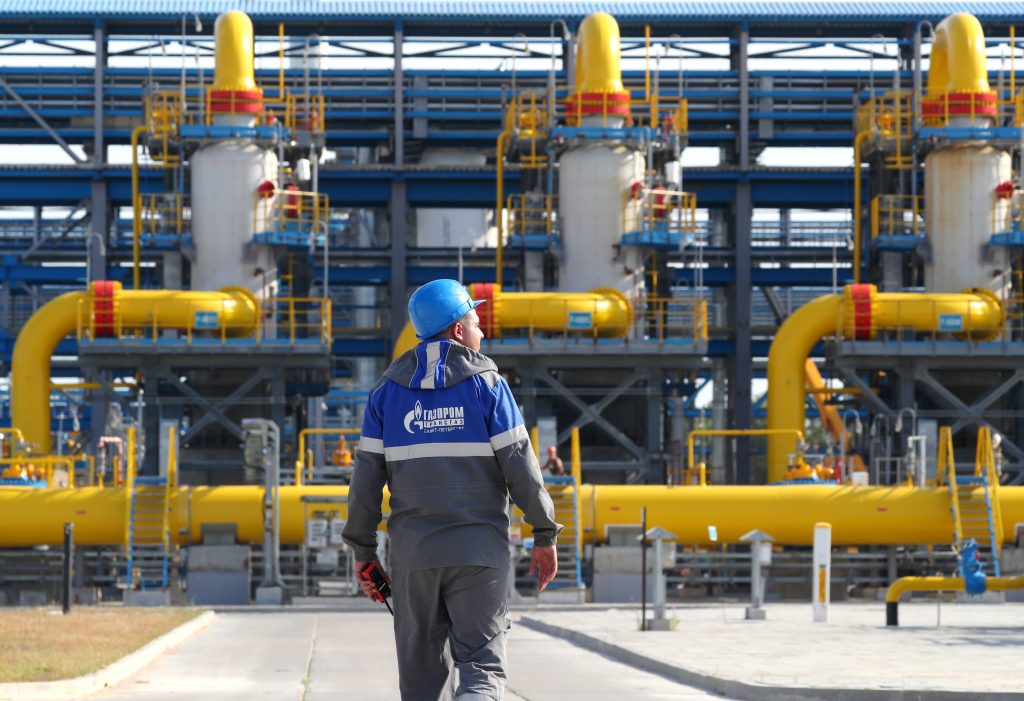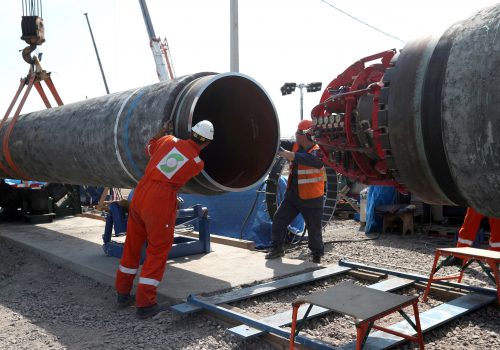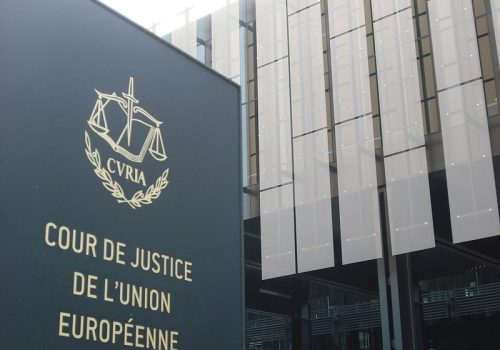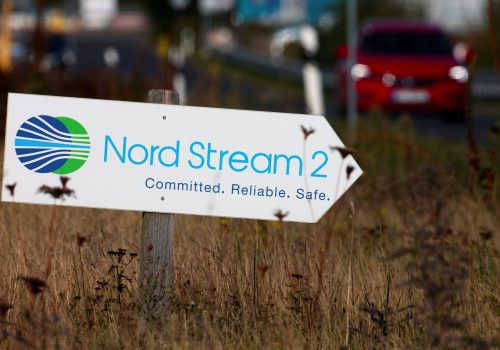Even after the United States and Germany released a joint statement on July 21 intended to ease widespread concerns over the Nord Stream 2 natural gas pipeline, the project continues attracting opposition in Washington and across Europe—and for understandable reasons.
For years, Russian President Vladimir Putin has used natural gas as a political weapon, especially against Ukraine, and Nord Stream 2 appears aimed at extending that leverage. At the St. Petersburg International Economic Forum in June, Putin himself threatened to cut gas transit through Ukraine if Kyiv failed to show sufficient “good will.” Meanwhile, Gazprom, the pipeline’s owner, is curtailing gas deliveries to Europe—a move that’s driving up prices—and hinting that the supply shortage will ease only when Nord Stream 2 is fully operational.
No wonder Ukrainians, Poles, many Germans, most of the European Parliament, many officials across the European Union (EU), and a strong majority of an oft-divided US Congress remain staunch in opposition to the project. That’s why Germany and the United States must work hard and fast to fulfill the pledges they outlined in their joint statement to push back against Russia’s weaponization of energy. They’d better: Germany and the United States now own the consequences if the project encourages Putin to further bully Ukraine or other European countries through energy or other means.
Political documents like the joint statement carry both risks and potential. At their worst, they provide cover for inaction. But at their best, they can mobilize governments to fix problems. The document was a big step for Germany, whose president earlier this year still maintained the pipeline was a strategic bridge to Moscow. If Berlin and Washington mean what they’ve said, their statement could serve as a platform to address, at least in part, the risks of Nord Stream 2 and thwart the Putin victory many critics fear.
Here’s what they should do, based on the joint statement’s provisions:
- Build on Germany’s commitment to measures—including sanctions—against Russian export capabilities to Europe in the energy sector or other economically relevant sectors, should Russia use energy as a weapon or otherwise boost its aggression against Ukraine. Targeting Russian exports is a new and potentially big step. It may be complicated to implement: Russia exports oil, gas, and other commodities to Europe—and to the United States, where Russia is a major source of crude oil—and rapid cut-offs may be tricky. The wording “export capabilities,” however, could include a set of new, creative sanctions—for example, blocking certain investments or access to technology in an attempt to go after Russian export potential. In any case, the United States, Germany, EU, and key EU member countries need to consult rapidly and prepare ways to implement this provision. The United States and Germany must also develop an understanding of the threshold above which Russia increases its aggression against Ukraine and uses energy as a weapon. The stronger the understanding, the greater the deterrent value of Germany’s commitment. The United States and Germany cannot afford to wait until after Putin makes a move to prepare their options.
- Build on Germany’s commitment to abide by the EU’s Third Energy Package with respect to Nord Stream 2. The Third Energy Package is a set of regulatory norms designed to avoid monopoly power over the EU energy system, including measures such as ownership unbundling, third-party access, and transparent tariffs. Given its closed and non-transparent nature, Nord Stream 2 and Gazprom do not fit well into Third Energy norms. Rigorous application of the Third Energy Package could either block Nord Stream 2 or compel substantial changes in its operation and ownership in ways that could make it less of an instrument to serve the Kremlin’s aims in Ukraine. There’s precedent for applying it too: The July decision by the Court of Justice of the European Union in the OPAL pipeline case ruled that “energy solidarity,” a key principle of the Third Energy Package, is a legal and not just political principle. The United States and Germany, consulting with the EU and interested European governments (including Poland’s and Ukraine’s) should determine how they will work with courts and regulators to compel Nord Stream 2 to adhere to European regulatory norms rather than rely on political protection to avoid them.
- Implement measures to support Ukraine’s energy-sector security and modernization, including Germany’s commitment (with US support) to seek a ten-year extension of Ukraine’s gas-transit agreement with Russia by September 1; and a set of US- and German-supported steps to help modernize Ukraine’s energy system, including integrating its electricity grid with Europe’s, making Ukraine an integral part of Europe’s energy transition. Dependent on Russian energy and a source of massive corruption, Ukraine’s energy system has long been a strategic liability. But Ukraine has made major progress in addressing both problems, giving both itself and the United States and Germany much room to work with. Extending the gas-transit agreement—and making it more costly for Russia to again cut off or reduce gas—would diminish Putin’s leverage over Ukraine (though enforcement will be a challenge). Energy-sector reform and integration with Europe could have significant long-term impacts if taken seriously. Germany and the United States will have to work fast to make progress on the gas-transit agreement extension. The joint statement means that Nord Stream 2 is now tied politically, if not legally, to the gas-transit agreement’s extension, That gives Germany some leverage, which it should use. The United States and Germany also committed in the joint statement to financially supporting Ukraine’s energy transition, including by funding the development of hydrogen and promoting renewable energy—something to which both can greatly contribute. Finally, the United States and Germany can combine these efforts with increased support for the Three Seas Initiative, a Central European-led infrastructure investment program that includes energy development.
The Biden administration’s appointment of Amos Hochstein as a State Department senior adviser for energy security on August 9 is a welcome development. Hochstein served in a similar role during the Obama administration, knows the issues and players well, and has long been an opponent of Nord Stream 2. He is the right person to oversee the implementation of the joint statement’s best provisions.
Both Hochstein and Germany’s forthcoming special envoy must act quickly. We recommend establishing a mechanism that includes the special envoys and their counterparts from other governments with equity in the issue, as well as working with the US-EU Energy Council, to monitor Russia’s actions. This mechanism should recommend responses, including sanctions and restrictions on Nord Stream 2, to any objectionable Russian energy policy.
Neither self-executing nor legally binding, the joint statement nevertheless contains commitments that, if implemented, could hold Russia more accountable and protect Europe’s energy security. Putin and regime-dominated Russian media have greeted the recent progress on Nord Stream 2 with a smirk—but through cooperation and determination, the United States, Germany, and Europe, Ukraine included, can turn this around.
Daniel Fried is the Weiser Family distinguished fellow at the Atlantic Council. He was the coordinator for sanctions policy during the Obama administration, assistant secretary of State for Europe and Eurasia during the Bush administration, and senior director at the National Security Council for the Clinton and Bush administrations. He also served as ambassador to Poland during the Clinton administration. Follow him on Twitter @AmbDanFried.
Ambassador Richard Morningstar is the founding chairman of the Atlantic Council’s Global Energy Center, former US ambassador to the European Union, and former US ambassador to the Republic of Azerbaijan.
Ambassador András Simonyi is a nonresident senior fellow at the Atlantic Council’s Global Energy Center and is a project director at George Washington University. He formerly served as the Hungarian ambassador to the United States.
Further reading
Image: An output filtration facility of a gas treatment unit at the Slavyanskaya compressor station in Russia's Leningrad region, the starting point of the Nord Stream 2 natural gas pipeline. Photo via Peter Kovalev/TASS.



